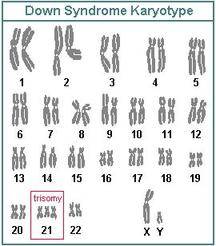What is Down syndrome?

Down syndrome, which results from people carrying an extra copy of chromosome 21, is characterised by learning difficulties, distinct physical features and a number of malformations and complications including:
- Heart defects
- Digestive malformations
- Hirschsprung disease
- Alzheimer's neuropathology
People with DS have differing mixtures of traits associated with the syndrome.
Click here for facts about Down syndrome
Why research into Down syndrome?
Down syndrome is the most common genetic cause of intellectual disability yet has long been an under-researched condition.
People with Down syndrome are increasingly living into their seventies and families are increasingly opting not to terminate DS pregnancies. These factors mean that the syndrome has an increasing global prevalence.
Both of these factors have led us to form the LonDownS Consortium and pool the expertise in Down syndrome research from the members to work together to understand the condition better.
Ageing and cognition in people with Down syndrome
Nearly everyone with Down syndrome has an intellectual disability and many people experience a decline in their cognitive abilities as they get older. This decline people experience was previously considered intractable, but recently this view has changed radically as several research groups, including ours, have started to dissect the neurobiology associated with Down syndrome, showing that pathological phenotypes in cellular models, and cognitive deficits in mouse models, can be mitigated using chemical compounds.
This has resulted in the first clinical trials for people with the syndrome, such as the use of antioxidants for dementia, and cognitive enhancement with GABA-A 5 inverse agonists, memantine and green tea extract.
Whilst the field is growing, we still need a deeper understanding of the pathobiology of cognitive impairment in people with Down syndrome.
 Close
Close

